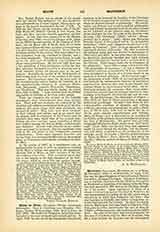

Maimbourg, Louis, French church historian, b. at Nancy, January 10, 1610; d. at Paris August 13, 1686. IA 1626 he entered the Society of Jesus, taught rhetoric and humanities for six years, and subsequently won considerable fame as a preacher. He is now known, however, more particularly as a prolific historical writer, an opponent of Jansenism and Protestantism, and a defender of “the Liberties of the Gallican Church” against the Apostolic See. Owing to his defense of Gallicanism, Pope Innocent XI ordered his expulsion from the Society of Jesus (1681). When he left the order, in 1682, Louis XIV granted him a pension and until his death he continued his literary pursuits in the Abbey of St. Victor, Paris. His works, remarkable for their elegant diction, are of little value, because somewhat untrustworthy. Among the most important of them are: (I)”Histoire de l’Arianisme” (Paris, 1673); (2)”Histoire de l’herksie des Iconoclastes” (Paris, 1674); (3)”Histoire des Croisades” (Paris, 1675); (4)”Histoire du schisme des Grecs” (Paris, 1678). The following works by him were placed on the “Index of Forbidden Books”: (I)”Histoire de la decadence de l’empire depuis Charlemagne” (Paris, 1676); (2)”Histoire du grand schisme d’Occident” (Paris, 1678); (3)”Histoire du Lutheranisme” (Paris, 1680); (4)”Traite historique de l’etablissement et des prerogatives de l’eglise de Rome et de ses eveques” (Paris, 1685); (5)”Histoire du Pontificat de S. Gregoire le Grand” (Paris, 1686). He is the author of histories of Calvinism, of the League, and of Leo the Great. His collected historical works were published at Paris, 1686.
N. A. WEBER

